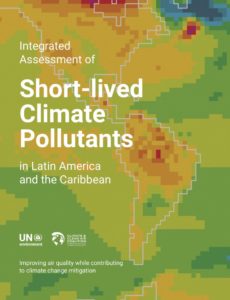Fast Mitigation to Save Lives and the Planet in Latin America and the Caribbean
Washington, DC – The implementation of measures to reduce air pollution and short-lived climate pollutants – which include black carbon, methane, tropospheric ozone, and hydrofluorocarbons (HFCs) – will reduce warming in Latin America and the Caribbean (LAC) up to 0.9º C by 2050, whilst providing significant other co-benefits. These are the conclusions of the first-ever Integrated Assessment of Short-lived Climate Pollutants (SLCPs) for the region.
The assessment, developed by 90 authors and led by experts from the region, was released today by the United Nations Environment Programme (UNEP) and the Climate and Clean Air Coalition(CCAC). It concludes efforts to reduce air and climate pollutants in the region could also help countries reap immediate and long-term benefits for health, reducing premature deaths from pollution by at least 26% from fine particulate matter and 40% from ozone annually, and avoid the loss of 3 - 4 million tonnes of staple crops –soybeans, maize, wheat, and rice – each year.
“For LAC, and for the world, cutting SLCPs is critical for climate protection,” said Durwood Zaelke, President of the Institute of Governance and Sustainable Development and a CCAC partner. “We can’t win the fight against climate change without fast mitigation action like these, which will make the difference between living in a safe climate and suffering from uncontrollable impacts, not least from feedback mechanisms that risk irreversible and potentially catastrophic effects”.
The LAC assessment identifies six technical and policy measures targeting methane, nine addressing major sources of black carbon, and six for HFCs, which can reduce regional emissions of these pollutants by 45%, 69%, and more than 80% respectively by 2030, with many positive examples of the required measures already in place across the region. Of the six measures for eliminating high-warming HFCs the rapid ratification and implementation of the Kigali Amendment to the Montreal Protocol is noted, which itself can avoid up to 0.5º Cglobally by the end of the century.
“These proposed near-term goals will help focus global action towards immediately available opportunities to avoid disaster,” said contributing author of the AssessmentRomina Picolotti, and IGSD Senior Counsel.“Quantifying the multiple benefits of air and super pollutant mitigation policies will allow for LAC to fully capitalize on the inherent synergies and co-benefits in these mitigation strategies, bringing the region closer to achieving their Paris Agreement commitments, and the 17 Sustainable Development Goals”.
The Integrated Assessment of Short-lived Climate Pollutants in Latin America and the Caribbean is here.
The CCAC’s press release on the Assessment is here.

